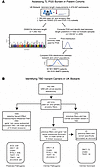Abstract
BACKGROUND Telomere biology disorders (TBDs) exhibit incomplete penetrance and variable expressivity, even among individuals harboring the same pathogenic variant. We assessed whether common genetic variants associated with telomere length combine with large-effect variants to impact penetrance and expressivity in TBDs.METHODS We constructed polygenic scores (PGS) for telomere length in the UK Biobank to quantify common variant burden and assessed the PGS distribution across patient cohorts and biobanks to determine whether individuals with severe TBD presentations have increased polygenic burden causing short telomeres. We also characterized rare TBD variant carriers in the UK Biobank.RESULTS Individuals with TBDs in cohorts enriched for severe pediatric presentations have polygenic scores predictive of short telomeres. In the UK Biobank, we identified carriers of pathogenic TBD variants who were enriched for adult-onset manifestations of TBDs. Unlike individuals in disease cohorts, the PGS of adult carriers did not show a common variant burden for shorter telomeres, consistent with the absence of childhood-onset disease. Notably, TBD variant carriers were enriched for idiopathic pulmonary fibrosis diagnoses and telomere length PGS stratified pulmonary fibrosis risk. Finally, common variants affecting telomere length were enriched in enhancers regulating known TBD genes.CONCLUSION Common genetic variants combined with large-effect causal variants to impact clinical manifestations in rare TBDs. These findings offer a framework for understanding phenotypic variability in other presumed monogenic disorders.FUNDING This work was supported by NIH grants R01DK103794, R01HL146500, R01CA265726, R01CA292941, and the Howard Hughes Medical Institute.
Authors
Michael Poeschla, Uma P. Arora, Amanda Walne, Lisa J. McReynolds, Marena R. Niewisch, Neelam Giri, Logan P. Zeigler, Alexander Gusev, Mitchell J. Machiela, Hemanth Tummala, Sharon A. Savage, Vijay G. Sankaran
This file is in Adobe Acrobat (PDF) format. If you have not installed and configured the Adobe Acrobat Reader on your system.
Having trouble reading a PDF?
PDFs are designed to be printed out and read, but if you prefer to read them online, you may find it easier if you increase the view size to 125%.
Having trouble saving a PDF?
Many versions of the free Acrobat Reader do not allow Save. You must instead save the PDF from the JCI Online page you downloaded it from. PC users: Right-click on the Download link and choose the option that says something like "Save Link As...". Mac users should hold the mouse button down on the link to get these same options.
Having trouble printing a PDF?
- Try printing one page at a time or to a newer printer.
- Try saving the file to disk before printing rather than opening it "on the fly." This requires that you configure your browser to "Save" rather than "Launch Application" for the file type "application/pdf", and can usually be done in the "Helper Applications" options.
- Make sure you are using the latest version of Adobe's Acrobat Reader.
ICMJE disclosure forms - Download (1.51 MB)



Copyright © 2025 American Society for Clinical Investigation
ISSN: 0021-9738 (print), 1558-8238 (online)

